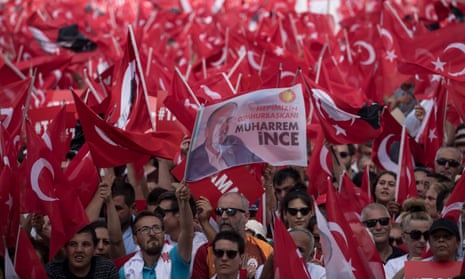There are two views of Istanbul from the office of Murat Sabuncu, the editor-in-chief of Cumhuriyet, Turkey’s oldest independent newspaper and the last still publishing. The windows on one side look on to an old cemetery. Those on the other side face the courthouse.
It is an apt metaphor for the newspaper, threatened with closure for daring to criticise the president, Recep Tayyip Erdoğan, and its editor, sentenced to seven and a half years in prison for doing his job.
Turkey is the world’s biggest jailer of journalists, ahead of China and Egypt. Seventy-three were imprisoned in 2017 alone and more than 120 have been jailed since a failed coup attempt in 2016. Hundreds have lost their jobs in the aftermath of the coup, while allies of the government have bought up most of the country’s news outlets to transform the vast majority of the media into a loyalist press.
“We are trying to be a newspaper that speaks the words of those who cannot speak and show the things that cannot be shown,” Sabuncu said.
Cumhuriyet journalists were detained in October 2016 as part of a sweeping crackdown by the government on dissidents. Twelve were arrested in dawn raids, and the chairman of the newspaper’s board, Akın Atalay, returned from a trip to Germany to turn himself in, all accused of aiding terrorist groups.
They were held for nine months without an indictment, until their trial began in July last year. The court ended up convicting 13 staff, most of whom are currently free pending appeals.
An appeal hearing in Sabuncu’s case is scheduled for July. Another court case could lead to government-appointed trustees assuming control of Cumhuriyet.
Turkey is days away from arguably the most important elections in its modern history. The winner of the presidential race will assume extraordinary powers that were narrowly approved in a referendum last year. Erdoğan is favoured to win.
Conditions in the country hardly allow for a fair contest. The polls will take place under a state of emergency imposed almost two years ago after the failed coup. Since then tens of thousands of people have been arrested or dismissed from their jobs in the media, judiciary, police, army and bureaucracy, often with little prospect for appeal.
Presidential candidates have repeatedly criticised that state media for giving much more airtime to the incumbent than his rivals. “Erdoğan didn’t buy the journalists,” said Aydın Engin, a veteran Cumhuriyet columnist who was also briefly imprisoned. “He bought out the media. The media is acting like an organ of [Erdoğan’s political party] the AKP.”
A report in April by the rights watchdog Amnesty, whose Turkey chair, Taner Kılıç, has been in jail for more than a year, described a “suffocating climate of fear” in the country. It said the government had deliberately and methodically set about dismantling civil society and had nearly destroyed Turkey’s legal system in its pursuit of dissidents.
But despite the perpetual state of crisis, Turkish voters have turned out in droves to opposition rallies, energising a contest whose outcome two months ago seemed to be pre-ordained. Unexpectedly dynamic campaigns by Muharrem İnce, the main challenger, and the breakaway nationalist Meral Akşener have revitalised a moribund opposition movement that has lost election after election.
Selahattin Demirtaş, the charismatic Kurdish leader of the People’s Democratic party (HDP), has run his campaign from a jail cell in Edirne, communicating to supporters through his lawyers.
AKP fears that it could lose control of parliament while retaining the presidency have pushed the government into promises of compromises, such as ending the state of emergency after the polls. But for many opposition activists, whether Erdoğan and his party win or not, what matters is they have once again found their voices.
“I believe the people and the journalists and democrats are going to change something rather than the politicians,” said Sabuncu. “I always thought smiling is a revolutionary act. I noticed that in the last 15 or 20 days, people started smiling again.”
